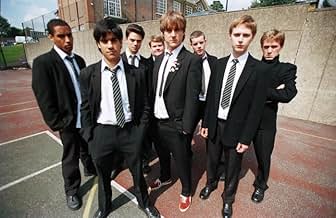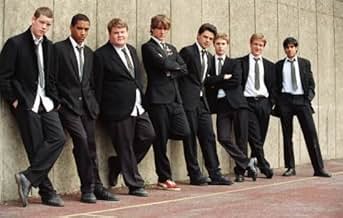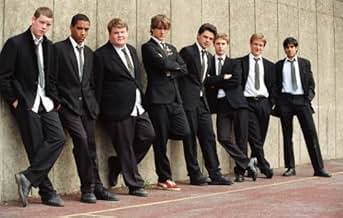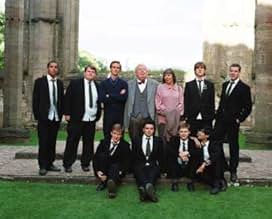Una classe di adolescenti indisciplinati, ma dotati e affascinanti, viene affiancata da due insegnanti dai metodi eccentrici e innovativi, perché il loro preside vuole che tutti siano accett... Leggi tuttoUna classe di adolescenti indisciplinati, ma dotati e affascinanti, viene affiancata da due insegnanti dai metodi eccentrici e innovativi, perché il loro preside vuole che tutti siano accettati a Oxford o a Cambridge.Una classe di adolescenti indisciplinati, ma dotati e affascinanti, viene affiancata da due insegnanti dai metodi eccentrici e innovativi, perché il loro preside vuole che tutti siano accettati a Oxford o a Cambridge.
- Nominato ai 2 BAFTA Award
- 2 vittorie e 15 candidature totali
Recensioni in evidenza
The above quote from the athletic, anti-intellectual Rudge in Alan Bennett's London and Broadway hit, The History Boys, is the antithesis of the high-minded quotes and philosophies spouted by teachers and aspiring "Oxbridge" scholars at a public grammar school in Yorkshire. Yet the quote epitomizes the sub-textual disdain for intellectual snobbery and solipsism that hangs about academic institutions anywhere, anytime.
History can be an accumulation of facts that have power in their reality ("This is Oxford and Cambridge. You don't just need to know it backwards. Facts. Facts. Facts."). Or it can be a set of insights into the human condition whose power derives from the understanding one extracts from them ("All knowledge is precious whether or not it serves the slightest human use."). This film reveals the tension between those poles of learning and the in-between state of wisdom.
It's 1983 in a boys' public grammar in Yorkshire as the gifted "history boys" prepare for their "Oxbridge" exams for entrance to Oxford or Cambridge. The months before the exams will put them in hyper drive as the results-oriented headmaster vies with the portly sensibility teacher, Hector, who believes more in the experience of education than the quantifiable outcomes. Memorized lines from Keats or learning French by acting out a scene in a brothel is his preferred mode.
The latent and sometimes overt homosexuality, not a stranger to boys' school, is handled as just another learning experience for boys and teachers, at least those couple of teachers such a Hector who are known to prefer boys. The sexual orientation is as much figurative for decisions that must be made and the experience that will bring understanding of life's unpredictability, not just historical facts. The acceptance and casualness of the issue stretches credulity, but not as metaphor.
The transition to film from stage is no always smooth: Some scenes are played directly into the camera; others are static, less fluid on screen than under the proscenium arch. But who cares with all that inspired dialogue? If you love to hear English as it was meant to be spoken, albeit highly stylized, and young people grappling with big ideas, see The History Boys.
The beauty - and also the shortfall - of The History Boys is that people who are steeped in theatre made it. With the modern genius of playwright Alan Bennett transferring stage to screen we can be grateful that his masterpieces will reach a wider audience. But this is Bennett-lite, and almost makes us long for the original, full-length work. There is a notable absence of cinematic flourish - use of lighting, camera-work, images and subtleties unique to the silver screen that could have lifted the spirit of The History Boys to something that is beyond the physical limitations of the original stage. There is nothing here that could not have been portrayed equally well there - which leads us to conclude that, apart from it being a more accessible medium, the film is nothing more than a shortened and only mildly adjusted copy of the play. All the actors have the same, excellent projection of voice and perfect intonation that carries well for a live performance but that lacks the sense of intimacy which the camera can bring. Facial expressions are slightly overemphasised, as befitting the stage, but lacking the subtlety usually required for good cinema. At times it sounds too much like a recitation or performance, resulting in an audience detachment that comes from not quite being able to believe in the reality of characters before us or the emotions they are going through. Director Nicholas Hytner (Center Stage, The Crucible, The Madness of King George) also has his roots firmly in theatre, yet his choice of subject matter has generally been so outstanding that he has reaped awards in spite of this clunky, stagey style (the one exception being The Object of My Affection - which was less well critically received). The History Boys is obvious BAFTA-bait but, like the Madness of King George, its pluses fortunately outshine its weaknesses, and the story, humour and intellectual substance are so engaging that you can be guaranteed lots of discussion afterwards with your fellow filmgoers.
In 1998, Bennett (who graduated from Exeter College Oxford in Medieval History) refused an honorary doctorate from Oxford in protest at its links with press baron Rupert Murdoch. If anybody has the background to tell an outrageously authentic and rebellious tale of a-list history students with homo-erotic leanings it must surely be Bennett. He skilfully navigates the ground between appealing to a predominantly gay audience and a mainstream one by sublimating much of the homosexual content beneath the time-honoured stiff upper lip of English public school tradition, and then including hilarious heterosexual content that makes seducing a woman into a war-game. Gilded epigrams, quotable quotes and the most stylish of double-entendres ('gobbets') flood our ears as the boys' literary skills are augmented with the most ingenious of schoolboy deceptions. An ad-libbed enactment of a brothel scene for a French class (where one of the lads removes his trousers for added realism) is transformed seamlessly to a battle front drama when the headmaster makes a surprise appearance. Literary references leap from Thomas Hardy and Keats to Brief Encounter and Carry On films, and this mind-enhancing (if questionable) juxtaposition is faultlessly analysed. The question of 'what is history' is pursued with some vigour, from the idea of 'subjunctive history' to Rudge's down to earth if academically challenged definition - just one effing thing after another. Different intellectual approaches are personified by teachers Hector (knowledge for its own sake, whether it seems useful or not), Irwin (flashes of insight and creativeness that stand out from the usual interpretations) and Mrs Lintott (who suggests radical reinterpretation from a feminist point of view, instead of history being the story of men's inadequate responses told from the point of view of other men).
If all this sounds like an overly cerebral experience, be assured that it races past so quickly that paying attention to the academic content is an optional extra. Lighter viewing can tune in unashamedly to the in-your-face humour, a great soundtrack (The Smiths, New Order, The Clash, The Cure) and additional musical interludes as the lads leap to an old piano and acquit themselves admirably with camp song routines.
Like the similarly highbrow Dead Poets Society and The Browning Version or the more basic Dangerous Minds, The History Boys relies for its emotional ballast on the familiar themes of seeing a successful adult in a promising student, and the frailty of the teaching process, especially when the teachers need to propel students to heights that they themselves have never reached. For all its failings, that it does so with the brilliance of one of our finest contemporary playwrights is reason enough to see it. With its classic portrayal of English institutions and education system it also, perhaps less justifiably, makes one kind of proud to be British.
The other reason is because the story is one beyond social judgment. Perhaps this is purposeful because being written, produced, directed, and acted by English people, class-consciousness is surely existent among them. But that's what I love so much about this film. The audience, in order to understand and enjoy it, must release themselves from the scrutiny of general culture over many, mostly sexual, aspects of life. The film is not about homosexuality, but homosexual goings-on exist prevalently in the story. It's also treated very nonchalantly, and many straight boys are free of any personal sexual burdens that would inhibit them from partaking. The very talked-about homosexual element of the film exists as the most direct example and also the core of the basis of the story, which is the pressure of society's judgmental and devastatingly interfering nature with many things that, if one were truly understanding, would not judge or interfere with. This extends to greater and more complex idealism in the script, such as the philosophy and meaning of education, the satisfactory or unsatisfactory pursuit and outcome of success, the importance of art and poetry, and the point of studying history.
I believe that The History Boys is an extremely important movie, and the fact that it lasted for a single week at a small theater here in Cincinnati is despicable and glaringly, stupidly contradictory to its message.
About a group of young British Oxford and Cambridge hopefuls who are being trained by their teachers to achieve this goal, "History Boys" is a film portraying young people at school that is the farthest thing from American, and that's a good thing. No characters fall into obvious stereotypes and they are all highly intelligent, gifted individuals. The boys aren't being educated to be smart, they're being challenged in their thinking and subsequently being challenged as people.
The subplot and controversy of the film is an incident involving misconduct between a student and the boys' primary teacher, Hector, played by Richard Griffiths who is most famous for his role as Uncle Vernon in the Harry Potter series. Homosexuality or the questioning of sexuality and sexual drives and the desire to please others that one is fond of (in the broadest sense) is a major undertone and many times a player in the film's events. It's a bit confusing, but it adds something more material to a film that often times seems to be footage of well-read individuals discussing literature. Anyone who is turned off by scholarly behavior and thought could not possibly enjoy this film because they'd feel bored and alienated.
The actors, all men mostly, are superb in the film, but Frances De La Tour while a definite supporting character carries her own power on the screen. The acting and characters are really the most important element of this film. It takes not time to establish its characters and relationships-you have to see them develop and insinuate them based on character interactions throughout the film. Since the film is mostly talking, there is a lot of opportunity for that.
While the viewer does feel very much on the outside of the plot, the actors and characters do tend to keep the interest level up and the ending is very nice and effective. The result is something much more meaningful and not nearly as gimmicky as the title "The History Boys" suggests.
Lo sapevi?
- QuizThe cast for this movie are the same cast who appeared in the original play at the National Theatre in London, England.
- BlooperLockwood was killed in action with the York and Lancaster Regiment. They were disbanded in 1968.
- Citazioni
Hector: The best moments in reading are when you come across something - a thought, a feeling, a way of looking at things - that you'd thought special, particular to you. And here it is, set down by someone else, a person you've never met, maybe even someone long dead. And it's as if a hand has come out, and taken yours.
- Curiosità sui creditiAt the beginning of the film, the title - "The History Boys" - is taken letter by letter from random parts of an essay on the dissolution of the monasteries, a common history topic, which the History Boys themselves write later on in the film.
- Colonne sonoreL'Accordéoniste
Music by Michel Emer
Lyrics by Michel Emer
© 1945 S.E.M.I., France / Peer Music (U.K.), Ltd., London
Performed by Samuel Barnett & Jamie Parker
I più visti
- How long is The History Boys?Powered by Alexa
Dettagli
- Data di uscita
- Paesi di origine
- Sito ufficiale
- Lingua
- Celebre anche come
- The History Boys
- Luoghi delle riprese
- Aziende produttrici
- Vedi altri crediti dell’azienda su IMDbPro
Botteghino
- Budget
- 2.000.000 £ (previsto)
- Lordo Stati Uniti e Canada
- 2.706.659 USD
- Fine settimana di apertura Stati Uniti e Canada
- 100.803 USD
- 26 nov 2006
- Lordo in tutto il mondo
- 13.407.101 USD
- Tempo di esecuzione
- 1h 49min(109 min)
- Colore
- Mix di suoni
- Proporzioni
- 1.85 : 1

























